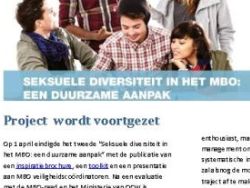The Netherlands strengthens her strategy towards vocational schools

19 September 2016 - The Dutch Ministry of Education decided to fund COC Netherlands, Theatre AanZ en EduDivers for another 2 years for a project to promote and integrate sexual diversity in vocational schools. This was reported by EduDivers in the third newsletter of the project.
Attention still need hard according to research
In May, the Dutch national safety monitor for vocational schools showed that over 88% of all VET (Vocational Education and Training) students and 91% of staff feel safe in their school. But LGBT students are almost three times more often victims of bullying, discrimination and other forms of psychological violence. For example, where 1.4% of heterosexual students are victims of vandalism, this percentage for LGBT students 4.3. The MBO Council (the national association of school boards) notes that schools need this insight to give more attention to sexual diversity.
Last week, the Dutch inspectorate published a report on safety of LGBT in schools. The Inspectorate notes that vocational schools lag behind in attention to sexual diversity.
New project, the same formula
The new project has the same formula as a project that ran in the last 1.5 years. Specific course departments of vocational schools are approached by Theatre AanZ with a temporary free offer of their show "No Face" for vocational students. In addition, the teams get a (free) teacher training by EduDivers and AanZ to start developing a strategy. Finally, EduDivers goes on to coach teacher teams to structurally embed sexual diversity in the course. For this integration, a toolkit has been developed. COC Netherlands approaches students to see if they want to establish a GSA (Gay/Straight Alliance) in their school.
Project formula works, but more leadership is desirable
The Radboud University researched the project impact. The study consisted of a pre- and posttest among teachers and managers and a series of interviews at the end of the project. The researchers draw some important conclusions:
- The intervention scores well on perceived effect. The number of teachers who think that the project has "much effect" went up from 7% to 24%, thus tripling. In addition, 53% of the teachers considering the project that the project has an "average" effect.
- The teachers are extremely enthusiastic about the quality of the performances of Theatre and very happy with the EduDivers training and with the GSA formula supported by COC Netherlands.
- In courses where the integration of sexual diversity succeeded less, this was attributed to a lack of involvement of the program managers. Management leadership appears to be crucial in the innovation process
+ Teachers think sexual diversity is the most difficult subject to discuss. Whether and how they do it this depends greatly on their personal experience and interest. In such a situation, LGBT role models among students and teachers play a major role. However, the researchers conclude that course innovation should not only be dependent on individual role models, no matter how inspiring they can be. Manager have to take leadership to manage full integration.
Source: EduDivers


